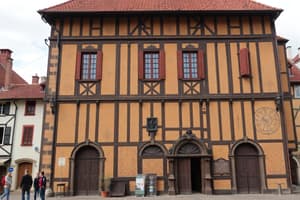Podcast
Questions and Answers
Which of the following events is most closely associated with the end of the Middle Ages?
Which of the following events is most closely associated with the end of the Middle Ages?
- The invention of the printing press
- The Black Death (correct)
- The signing of the Magna Carta
- The Renaissance
Humanism primarily focuses on religious themes and doctrines.
Humanism primarily focuses on religious themes and doctrines.
False (B)
What was the primary aim of Absolutism in governance?
What was the primary aim of Absolutism in governance?
To centralize power in the hands of a single ruler.
The Treaty of _____ ended the Thirty Years' War in 1648.
The Treaty of _____ ended the Thirty Years' War in 1648.
Match the following figures with their contributions in the Renaissance:
Match the following figures with their contributions in the Renaissance:
Which of the following conflicts occurred during the 17th century?
Which of the following conflicts occurred during the 17th century?
The Napoleonic Code was established after the French Revolution.
The Napoleonic Code was established after the French Revolution.
What idea did John Stuart Mill advocate in his writings?
What idea did John Stuart Mill advocate in his writings?
The _____ Revolution was a pivotal moment in history that resulted in the overthrow of the monarchy and the rise of a republic in France.
The _____ Revolution was a pivotal moment in history that resulted in the overthrow of the monarchy and the rise of a republic in France.
Match the following events with their descriptions:
Match the following events with their descriptions:
Which economic theory emphasizes the value of trade and accumulation of wealth?
Which economic theory emphasizes the value of trade and accumulation of wealth?
The Baroque period is characterized by simplicity and minimalism in art and architecture.
The Baroque period is characterized by simplicity and minimalism in art and architecture.
Name one key figure associated with the Enlightenment.
Name one key figure associated with the Enlightenment.
The Treaty of _____ ended the Thirty Years’ War in Europe.
The Treaty of _____ ended the Thirty Years’ War in Europe.
Which event is associated with the establishment of the United Nations?
Which event is associated with the establishment of the United Nations?
Flashcards
Feudal System
Feudal System
A system of social and political organization in medieval Europe based on a hierarchy of lords and vassals, where land ownership was exchanged for services and loyalty.
Black Death
Black Death
A devastating pandemic that swept through Europe in the mid-14th century, killing millions and leading to significant social and economic disruption.
Hundred Years War
Hundred Years War
A series of conflicts between England and France from 1337 to 1453, primarily over the French throne and control of territories.
Renaissance
Renaissance
Signup and view all the flashcards
Absolutism
Absolutism
Signup and view all the flashcards
Deism
Deism
Signup and view all the flashcards
Enlightenment
Enlightenment
Signup and view all the flashcards
Scientific Revolution
Scientific Revolution
Signup and view all the flashcards
Romanticism
Romanticism
Signup and view all the flashcards
Nationalism
Nationalism
Signup and view all the flashcards
Utilitarianism
Utilitarianism
Signup and view all the flashcards
Communism
Communism
Signup and view all the flashcards
Expressionism
Expressionism
Signup and view all the flashcards
Fascism
Fascism
Signup and view all the flashcards
Cold War
Cold War
Signup and view all the flashcards
Study Notes
Key Topic Areas
- Six historical thinking concepts
- Late Middle Ages
- Renaissance
- Reformation and Religious Wars
- New World Exploration
- Absolutism and Constitutionalism
- Scientific Revolution
- Enlightenment
- French Revolution and Napoleonic Era
- Industrial Revolution
- Age of Nationalism and Unification
- Age of Ideologies
- Imperialism
- World War I
- Rise of the Dictators
- World War II
- Cold War
- Art through the Ages
Potential Terminology
- Feudal System
- Black Death
- Hundred Years War
- Renaissance
- Thomas More
- Castiglione
- Erasmus
- Machiavelli
- Humanism
- Printing Press
- Martin Luther
- Act of Supremacy
- Henry VIII
- John Calvin
- Inquisition
- Peace of Augsburg
- Catholic Reformation
- Spanish Armada
- St. Bartholomew's Day Massacre
- English Civil War
- Glorious Revolution
- Newton
- Descartes
- Mannerism
- War of Austrian Succession
- War of Spanish Succession
- Neoclassicism
- Adam Smith
- Enlightened Despotism
- Tennis Court Oath
- Civil Constitution of the Clergy
- Declaration of Rights of Man & Citizen
- Committee of Public Safety
- Concordat
- Scorched-Earth Policy
- Napoleonic Code
- Hundred Days
- Romanticism
- Thomas Malthus
- Continental System
- Congress System
- Utilitarianism
- Edict of Nantes
- Treaty of Westphalia
- Thirty Years' War
- Mercantilism
- Copernicus
- Galileo
- Deism
- Bacon
- Hobbes
- Locke
- Baroque
- Seven Years' War
- Salon
- Rococo
- Voltaire
- Montesquieu
- Rousseau
- Third Estate
- Bastille
- Edmund Burke
- Robespierre
- September Massacres
- Great Fear
- Reign of Terror
- Directory
Additional Terminology (Page 3)
- Robert Owen
- Restoration
- Three Emperors' League
- Opium Wars
- Realpolitik
- Cavour
- Crimean War
- Mass Politics
- Realism
- Imperialism
- Triple Alliance
- Black Hand
- Gallipoli
- Brusilov Offensive
- Russian Revolution
- Fascism
- Symbolism
- Nuremberg Laws
- Appeasement
- Miracle at Dunkirk
- Battle of Stalingrad
- Operation Overlord
- Nuremberg Trials
- Cold War
- NATO
- Korean War
- Vietnam War
- European Union
- War on Terror
- Global Warming
- Saint-Simon
- Carlsbad Decrees
- Poor Laws
- Nationalism
- Bismarck
- Austro-Prussian War
- Dreyfus Affair
- Social Darwinism
- Scramble for Africa
- Triple Entente
- Schlieffen Plan
- Battle of the Somme
- Treaty of Brest-Litovsk
- Five-Year Plans
- March on Rome
- Enabling Act
- Munich Agreement
- Battle of Britain
- Rape of Nanking
- Final Solution
- United Nations
- Truman Doctrine
- Cuban Missile Crisis
- Decolonization
- Israel
- Financial Crisis
- Feminism
- John Stuart Mill
- Metternich
- Factory Act
- Revolutions of 1848
- Danish War
- Franco-Prussian War
- Impressionism
- Communist Manifesto
- Russo-Japanese War
- Reinsurance Treaty
- Battle of Verdun
- Battle of Tannenberg
- Treaty of Versailles
- Gulags
- Expressionism
- Night of the Long Knives
- Nazi-Soviet Pact
- Operation Barbarossa
- Battle of Midway
- Manhattan Project
- Warsaw Pact
- Berlin Blockade
- Chinese Revolution
- German Reunification
- Soviet-Afghan War
- Information Age
Studying That Suits You
Use AI to generate personalized quizzes and flashcards to suit your learning preferences.




